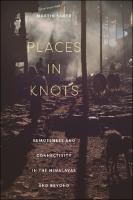Places in Knots
Remoteness and Connectivity in the Himalayas and Beyond
Abstract
Tracing the experiences of mobile Himalayans across the globe, Places in Knots describes the ways in which Himalayan people relate to the multiple places they inhabit and the work and trouble of keeping their communities tied together. Martin Saxer describes global Himalayan ventures as a form of expansion of community rather than out-migration. Moving out does not sever the bonds of community. Instead, it is the pull that tightens the knot. Coffee-table books and trekking agencies continue to advertise the Himalayas as remote "hidden valleys," and NGOs see them as fragile mountain ecosystems to be protected from global forces of destruction. Places in Knots shows how these tropes of remoteness inform development and conservation policies and thus shape the contexts in which Himalayan connections with the wider world are forged and maintained. Following Himalayan journeys between valleys in Nepal and beyond, Saxer draws a picture of globalization that emerges not from the centers or below—but rather from the edge. Thanks to generous funding from LMU München, the ebook editions of this book are available as Open Access volumes from Cornell Open (cornellpress.cornell.edu/cornell-open) and other repositories.
Keywords
mobile himalayan communities, nepal new york connections, road construction in nepal, himalayan trade, villages in walung and upper humla, cross-border relationships between tibet and nepal.ISBN
9781501766879, 9781501766886, 9781501766893, 9781501766862, 9781501766879, 9781501766886Publisher
Cornell University PressPublisher website
https://www.cornellpress.cornell.edu/Publication date and place
Ithaca, 2023Imprint
Cornell University PressClassification
Social and cultural anthropology
Asian history
Migration, immigration and emigration
Relating to migrant groups / diaspora communities or peoples


 Download
Download Download
Download Web Shop
Web Shop